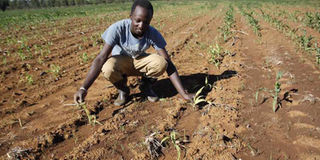UASIN GISHU: Drop in maize yields looms due to poor fertiliser

Jeremiah Kipyego shows the maize crop on his family’s farm at Kabenes in Uasin Gishu County last week. Farmers blame uneven germination and yellowing of their crop on sub-standard fertiliser. PHOTO | JARED NYATAYA | NATION MEDIA GROUP
What you need to know:
- Last season, Rift Valley produced about 21 million bags but this may drop to 17 million bags.
- The distribution of substandard fertiliser in the region earlier this year could seriously affect food security.
- Farmers blame this on manipulation of the distribution of subsidised fertiliser by unscrupulous people.
- Some people were arrested in Kitale in February with fertiliser manufacturing equipment.
The use of sub-standard fertiliser could lead to a drop in maize yields in the Rift Valley by four million bags.
Last season, the region produced about 21 million bags but this may drop to 17 million bags this season following a strange yellowing of the crop, which is threatening yields.
North Rift is the country’s grain basket but the distribution of substandard fertiliser in the region earlier this year could seriously affect food security.
A check by the Nation in the region revealed that crops were turning yellow and there was uneven germination, a sign of deficiency in nutrients.
Farmers blamed this on manipulation of the distribution of subsidised fertiliser by unscrupulous people.
Some people were arrested in Kitale in February with fertiliser manufacturing equipment.
Uasin-Gishu Kenya Farmers Association Director Kipkorir Menjo urged the Ministry of Agriculture to test the affected crops.
“We believe the fertiliser supplied to the region was sub-standard,” said Mr Menjo.
“We fear unscrupulous individuals took advantage of farmers who were impatient to plant following the start of the rains to supply them with sub-standard fertiliser,” he said.
The worst hit areas are Moi’s Bridge, Ziwa, Moiben, Turbo and Soy.
Farmers preparing their land for the approaching wheat planting season are afraid they might have a similar experience.
“We need to establish the scientific facts behind this strange phenomenon. It seems the fertiliser supplied is not compatible with the soil in this region. We’ve been farming for years and have not seen this before,” said Mr James Rogony, whose 50-acre farm in Ziwa has been affected.
Last Thursday, a team comprising National Cereals and Produce Board and Flying Squad officers found subsidised fertiliser worth Sh6 million concealed in a private warehouse in Nakuru town.
NCPB Chairman Geoffrey King’ang’i said the fertiliser was being transported from the port of Mombasa to its depot in Kitale when a private transporter diverted it.
DEMANDED COMPENSATION
Governor Jackson Mandago also demanded that the Agriculture ministry tests on the fertiliser to establish the reason for the poor crop.
“We want an explanation from the ministry. I believe the fertiliser supplied by the ministry is the cause,” Mr Mandago said.
He also demanded compensation for the farmers if investigations proved his fears.
Farmers have, in the meantime, called on the government to supply CAN fertiliser in a bid to save the affected crops.
The Uasin-Gishu County Assembly has also called for investigations into the subsidised fertiliser.
A motion tabled in the House last Friday by Soy MCA Isaac Chirchir petitioned the regional government to investigate.
“Soon after germination, the maize turned yellow in the entire county,” said Mr Chirchir.
Moi’s Bridge Ward MCA Daniel Sanga urged the county government to take up the matter urgently as agriculture is a devolved function.
“If there is anybody within this government supplying fake fertilisers, this person should be made a lesson of to other unscrupulous dealers fleecing farmers,” he said.
Tembelio MCA Pius Kigen said farmers in his ward had bought Sh50 million fertilisers from the NCPB and risked losing it if the crop was a total failure.
Fertiliser distribution this year was marred by so many complaints that Deputy President William Ruto and Agriculture Cabinet Secretary James Bett made an impromptu visit to Eldoret NCPB depot to assess the situation.




